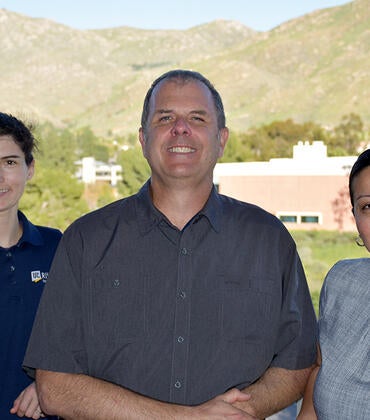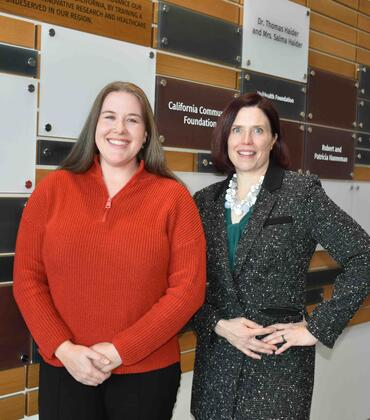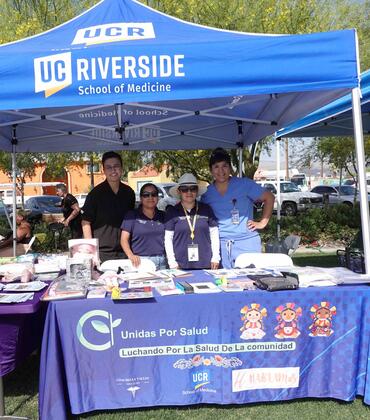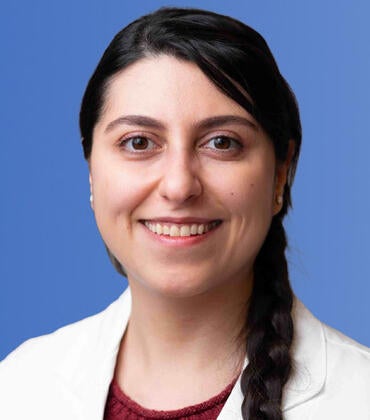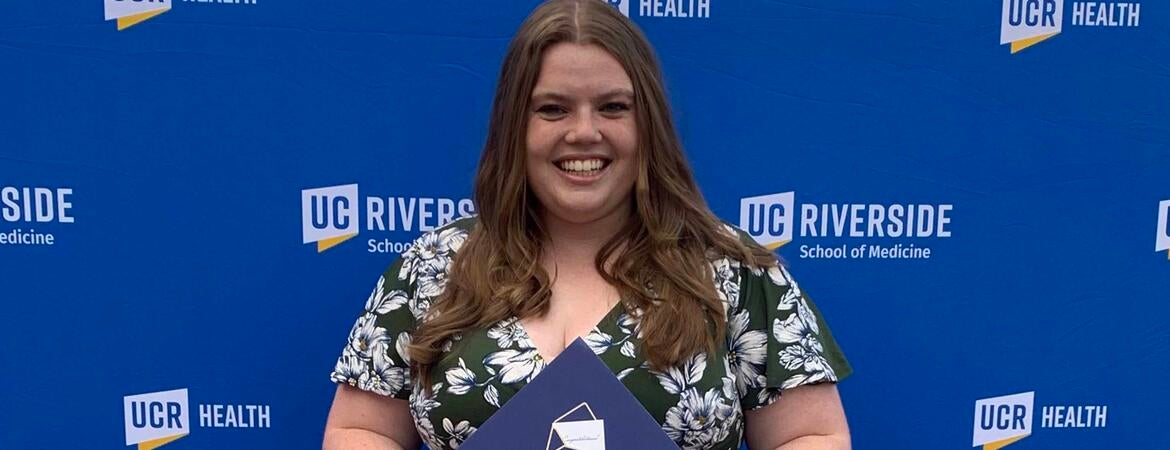
Growing up in Riverside with two psychotherapist parents, Seiberling knew as a child that she wanted to become a doctor. “I think at a young age, I was just really enamored with the idea of having the knowledge and the ability to bring calm to hectic situations,” she recalled. “There were a few people in my family living with chronic disease and a lot of people in my community who had to interface with the healthcare system a lot, and it just seemed like part of what made a really big difference in their experience was the doctor that they worked with.”
The decision surprised Seiberling’s parents, Deborah Montana, LMFT and Mark Seiberling, LCSW, as she was the first in the family interested in becoming a physician. As Seiberling got older and discovered her interest in science, her resolve grew stronger. “It just became more and more clear to me that medical school was the right decision for me,” she said.
When the UCR SOM’s first four-year class was admitted in 2013, Seiberling was finishing high school. “I remember it just being a really big deal for the community,” she said. “It started these conversations about the specific healthcare disparities around where we live, and it felt like one of the first times I had the data to back up my suspicion that this area was more underserved than other places.”
The SOM’s mission of increasing healthcare access in the Inland Empire spoke to Seiberling, and she applied to medical school with UCR as her top choice. “Getting in was very much a dream come true,” she said, noting that her mother also attended UCR as an undergraduate. Building on her family’s commitment to serving the community, she said, “I wanted to continue to be a part of making healthcare in this region better.”
Choosing psychiatry
Seiberling originally planned to focus on OB/GYN, but fell in love with psychiatry during one of her rotations. The field built on her undergraduate neurobiology major at UC Berkeley and she appreciated the focus on viewing each patient holistically, addressing the context of their lives to best meet their mental health needs. “My experience rotating and getting to see all of that theory put into action for patients just lit me up inside,” Seiberling said. “I came home excited every day, and I just knew this was what I wanted to do for the rest of my life.”
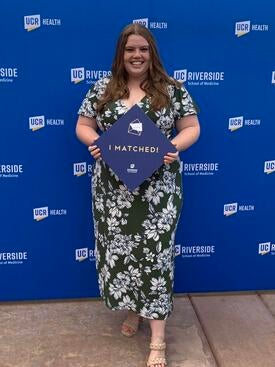
While both of Seiberling’s parents were psychotherapists, she had initially ruled out the field based on their experiences with their jobs: her mother as a therapist in special education programs in public schools, and her father as a therapist for individual patients. “Both of them loved their work, but working in mental health, especially in underfunded public programs, can be really emotionally taxing, and it can be painful in the long term to try to help patients and watch them not necessarily get better,” Seiberling said. Concerned about the potential for burnout, Seiberling’s parents at first attempted to steer her away from the field.
However, Seiberling felt that her additional training as a physician might help make the difference for her career. “I'm hopeful being in that leadership position and having the additional tools that come with being a physician will help me maintain the resilience necessary to do this work,” she said.
A patient that Seiberling met on another of her rotations also influenced her decision to pursue psychiatry. The man, who’d grown up in the Inland Empire not far from Seiberling, was experiencing long-term health effects from substance use stemming from several psychiatric disorders. When speaking to him, Seiberling discovered many parallels between their experiences, from schools to community groups and more. “It felt like in a lot of ways the medical and social services safety net that exists had missed this person, and because of that his life was going to be cut short,” she said. “It just left me feeling really frustrated that our healthcare system can leave some people behind and can also just make people feel so judged that they're afraid to continue to ask for help,” she continued, adding that she has thought about that patient – who was discharged home on hospice – almost every day since working with him. “That case fully solidified for me that it's not just that I love psychiatry specifically, it's that I feel really strongly about the importance of the work and the importance of treating the patients who need us with dignity and respect and compassion.”
Volunteering to improve healthcare
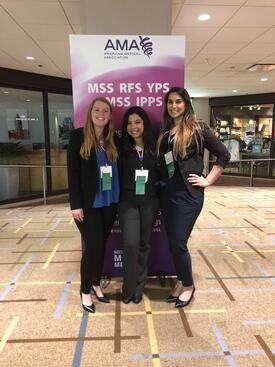
Throughout her time at UCR, Seiberling strove to make a difference both with her patients and on a broader level. She volunteered with organizations including the American Medical Association and the California Medical Association, working both on campus and on national committees to represent UCR and advocate for policies to improve medical care for patients. “I really enjoyed the experience of collaborating with peers at other schools in California and across the country on legislative issues,” Seiberling said, explaining that they worked on issues including advocating for single-payer healthcare, more accessible health insurance, and legislative changes to protect patients’ autonomy over their bodies after the 2022 Supreme Court decision in Dobbs v. Jackson limited abortion rights.
Seiberling further worked to promote reproductive access through the organization Medical Students for Choice. With UCR’s chapter, “We tried to bring in educational opportunities that would enlighten some of my peers on the realities of what restricting access to reproductive health care looks like,” she said. Seiberling added that these efforts also gave medical students the chance to practice clinical skills needed to provide reproductive health care.
In addition to her policy work, Seiberling volunteered at the Riverside Free Clinic and the San Bernardino Free Clinic, student-run clinics that provide a range of affordable health services. “It was really rewarding and also really enlightening to see the challenges of bringing medicine to underserved people,” she said. “I'm really grateful for my experience there.”
Overcoming bumps in the road
Despite all she accomplished, Seiberling, who entered the SOM as part of the class of 2022, had to persevere through unique challenges to earn her MD. “I took the long road through med school a little bit,” she said. Beginning in early 2020, Seiberling took a two-year leave to help her family during the stress of the coronavirus pandemic. “I knew at that time that I wasn't going to be able to give this education all of the attention and brain space that it deserves, and the best thing for me was to just step off the treadmill for the first time and focus on the people in my life,” she explained.
Seiberling said she felt a sense of shame and disappointment from taking leave and impacting her medical school experience. “But I also know that taking that time made me a happier and healthier person, and I know that it made me a better doctor,” she said, adding that she appreciated the support she received from the SOM.
“It's honestly been very cool to watch the people I started med school with who are now halfway through their residencies, and watching them go out into the world and be fully fledged doctors and knowing that I get to follow right behind them,” Seiberling added. “I'm glad that I got to be there for the people that I love then, and I'm glad that I get to be here for myself and my patients now.”
A family business of serving the community
Seiberling will remain at UCR for her residency in psychiatry, the next step toward her goal of practicing in the Inland Empire for her career. At the moment, she said she hopes to focus on inpatient psychiatry, specifically on substance use disorders and eating disorders in adults. Both, she explained, are highly stigmatized, chronic conditions that patients must learn to manage with help from their doctors.
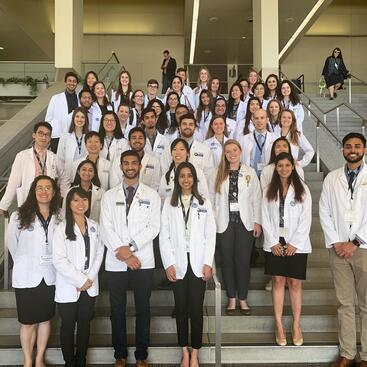
“We are extremely honored that Julia chose to stay close to home and we feel very fortunate to have matched her into the general psychiatry residency at UCR SOM,” said Richard J. Lee, MD, the program director of the Child & Adolescent Psychiatry Fellowship Program and a health sciences associate clinical professor who supervised Seiberling during her third-year psychiatry rotation at the Children’s Treatment Services Clinic at Riverside University Health System. “As a medical student, Julia showed great leadership skills and a sincere commitment to improve the existing health care disparities in her home county of Riverside, where there is an extreme shortage of psychiatrists.”
As Seiberling neared the completion of her medical degree, she was surprised to see her mom – who recently left her therapy work in the school district to open a private practice – seek her advice. “Every now and again she'll call me and vaguely talk through a case that she has and she'll be like, ‘What do you think, doc?’” said Seiberling, laughing. “I told her to talk to me in a couple years when I know more,” she continued. Still, Seiberling said that she enjoys sharing insights with her parents.. While her father retired from practice a few years ago, both of her parents also work as doctoring instructors at the UCR SOM.
For Seiberling, serving her home community through medicine is simply carrying on a family tradition. “I did my OB/GYN rotation on the same floor where me and my sister were born, and I got to work and do surgery and ICU at the hospital where my grandma used to be a switchboard operator,” said Seiberling. “I feel my family's roots in this area very strongly when I'm working in these hospitals and it means a lot to me.”
Now, Seiberling’s sister Grace is studying social work with her own focus on community service. “It's like the family business is trying to take care of people and make our communities serve people better,” said Seiberling. “It's something about my family that I'm genuinely very proud of.”
Seiberling looks forward to using her degree to help underserved patients in the local community for years to come. “I think it’s important to remember that the people we see in our community, our neighbors, our friends, our colleagues, anyone, are people just like us who deserve care,” she said. “We can show up for them in a lot of different ways,” she added, “including going to medical school.”
